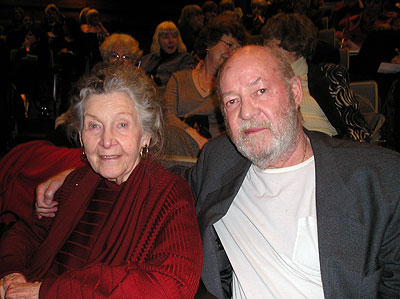A version of this article appears in print on July 20, 2018, on Page A24 of the New York edition of the New York Times.
The psychoanalyst and author Marion Woodman shown here with Daryl Sharp, publisher of several of Woodman’s books.
 Marion Woodman, a psychoanalyst whose popular books and lectures on mythical archetypes resonated with millions of women longing for a language to explore the primal, unconscious elements of feminine identity, died on July 9 in London, Ontario. She was 89.
Marion Woodman, a psychoanalyst whose popular books and lectures on mythical archetypes resonated with millions of women longing for a language to explore the primal, unconscious elements of feminine identity, died on July 9 in London, Ontario. She was 89.
Dr. Woodman’s own self-transformation, in her mid-40s, stood as an example to the many others for whom she would become a catalyzing influence. In the early 1970s, after a long career as a high school English and drama teacher, she moved from Ontario to England with her husband, Ross Greig Woodman, a college professor who was on sabbatical at the time. There she entered analysis with Dr. E. A. Bennett, a renowned practitioner of therapy rooted in the work of Carl Jung, the Swiss psychiatrist and collaborator with Freud.
That experience drew her to the C. G. Jung Institute in Zurich, where she completed training in 1979 before setting up practice back in London, Ontario. She adapted and applied Jung’s ideas about the mythical archetypes underpinning the psyche to help her clients resolve problems like depression and eating disorders. Centuries of “patriarchal thinking,” she concluded, had obscured elements of primal feminine consciousness, in both men and women.
In a series of books, including “Addiction to Perfection,” “The Pregnant Virgin” and “Bone: Dying Into Life,” Dr. Woodman found an international audience, giving women a poetic, mythically vivid sense of femininity in the same way that the poet Robert Bly did for men through the 1980s and ’90s, most notably in his best-selling book “Iron John.”
In 1998, she and Mr. Bly wrote a book together, “The Maiden King: The Reunion of Masculine and Feminine,” arguing that both genders needed to incorporate elements of the other to become whole.
She elaborated on those themes to increasingly large audiences around the world, in what she called “BodySoul workshops.”
“She had that dramatic flair to her, and a poetic sensibility, that really came out when she was speaking,” said Dorothy Gardner, a Jungian analyst in Toronto and a former collaborator. “She was very present to others, and she had an amazing gift of making you feel you were the only one in the room — that she was talking to you alone — though many others were there.”
Dr. Woodman, she added, “really helped a lot of women understand problems like addiction and eating disorders from a psychological perspective that was relatively new at that time.”
Judith Harris, a Jungian analyst in Zurich, said Dr. Woodman “had the courage to explore the images of illness people held in their bodies.”
“Both as analyst and workshop leader,” she added, “she would go places where others were afraid to go.”
Marion Jean Boa was born in London, Ontario, on Aug. 15, 1928, the first of three children of Andrew Boa, a minister, and Ila (Phinn) Boa, a homemaker. She studied at the University of Western Ontario and taught for more than 20 years at the South Collegiate Institute in London. Her husband was a professor of English at the university and the author of several books.
As a teacher Ms. Woodman won a reputation for turning “terminal boys,” as troublemaking youths were called, into students.
After returning from Zurich, she and one of her brothers, Fraser Boa, also a psychoanalyst, helped found the Ontario Association of Jungian Analysts. He died in 1992. Another brother, Bruce Boa, a film and television actor, died in 2004. Her husband died in 2014.
“As consciousness develops, the body will act as a donkey for only so long,” Dr. Woodman wrote in one of her books. “Men as much as women need to know that their soul is grounded in their own loving matter: ‘This is who I am. Every cell in my body tells me this is of value to me — not to my persona, to me.’ ”